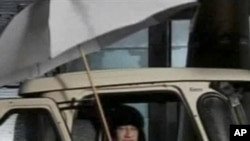Libyan leader Moammar Gadhafi briefly appeared on state television early Tuesday as his faltering 40-year regime showed more signs of crumbling in the face of a widespread popular uprising that has escalated into open, deadly confrontation.
Mr. Gadhafi, who appeared under a large umbrella learning out from the front seat of a van, said he was in Tripoli and not Venezuela. Reports on Monday said the Libyan leader was seeking asylum in the South American country.
Reports from the Libyan capital, Tripoli, said helicopters and warplanes struck parts of the city Monday but Mr. Gadhafi's son, Saif al-Islam Gaddafi, said the planes had only hit ammunition dumps. Witnesses in Tripoli gave multiple accounts of armed African mercenaries opening fire on protesters. Two residents said they saw African soldiers deplane from military transport flights at an airbase near the capital.
|
VOA Correspondent Elizabeth Arrott speaks with Middle East Monitor Host Susan Yackee:
|
Residents said crowds of pro-Gadhafi supporters took over Tripoli's Green Square after truckloads of militamen had arrived and opened fire on anti-regime demonstrators. The country's legislative branch and two buildings housing Libyan television channels were among government buildings set ablaze as opposition activists battled security forces and government supporters.
Human Rights Watch says it has confirmed 233 people killed in five days of violence, mostly in the country's eastern provinces which have reportedly now fallen under the control of anti-Gadhafi forces.
The Paris-based International Federation for Human Rights said Monday at least nine Libyan cities, including Benghazi, Sirte and Misrata, were in the hands of the protesters. Reports cannot be independently confirmed and communications with Libya from outside the country remain difficult.
Watch Video of the Libyan Protests:
In a sign of growing cracks within the government, several senior officials - including the justice minister and members of the Libyan mission to the United Nations - broke with Colonel Gadhafi. Libya's deputy ambassador to the U.N., Ibrahim Dabbashi, called for the embattled leader to step down and said he should stand trial for war crimes. He accused the regime of having "started genocide against the Libyan people."
There are other accounts of officials fleeing the country and a string of defections by Libyan ambassadors abroad.
Separately, military officials on the nearby island nation of Malta report that two Libyan fighters jets landed there and their pilots defected, saying they had been ordered to attack protestors.
Mr. Gadhafi's son Saif al-Islam went on state television late Sunday to proclaim that his father remains in charge with military support in the face of the most serious anti-government revolt since the elder Gadhafi took power in a 1969 coup. Saif al-Islam Gadhafi vowed that the government will fight until "the last man, the last woman, and the last bullet" to stay in power.
Wagging his finger in a rambling address, the younger Gadhafi warned Libyans to stop the uprising or risk igniting a civil war that will drown the country in "rivers of blood" and lead to a return of colonial powers. He insisted that Libya is "not Egypt or Tunisia" - neighboring countries whose strongmen were swept from power in recent weeks.
Saif al-Islam Gadhafi blamed the protests that erupted in eastern Libya last Monday on a variety of culprits, including Libyan exiles, Islamists, foreign media, and drug abusers. But, he conceded that Libyan security forces had made some "mistakes" in cracking down on demonstrators because of a lack of training in dealing with such situations. In a conciliatory move, the younger Gadhafi said the government is willing to begin a dialogue on political reforms, including a new constitution and confederate power structure.
In other developments Sunday, a representative of Libya's powerful Warfallah tribe said it has turned against Moammar Gadhafi and is siding with the opposition.
Libyan authorities have cut Internet and some telephone services in response to the protests but foreign media organizations have been able to speak to witnesses in the country through satellite phones and other connections.
Some information for this report was provided by AFP and Reuters.














